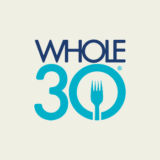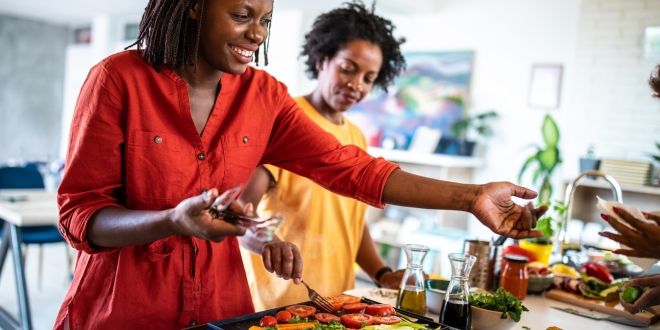Your recipe for Whole30 success will look different than anyone else’s. Why wouldn’t it? Each of us is working with unique ingredients. Though there isn’t a “normal” Whole30 experience, we’ve watched and helped millions of people do the program. With that much experience, patterns have clearly emerged, which better equip us to help you prepare for a Whole30.
What sticks out the most is the key role preparation plays in Whole30 success. Can you get through the program by sheer will and grit? Maybe. But why struggle like that when a little bit of preparation can make your program easier, more successful, and more insightful?
We have plenty of planning content, but today we’ll focus on skills you can practice before Day 1 to maximize your Whole30 success.
Practice your meal planning
Meal planning is a skill that will serve you during your Whole30 and well beyond. Knowing what you’re eating ahead of time helps in many ways. It keeps your health goals on track. You save time and money by making grocery shopping more efficient and minimizing food waste. Planning also takes the stress out of the “what’s for dinner?” question—that alone is worth it.
The best way to practice meal planning is to just dive in. This skill isn’t program specific so you can start well before your Whole30 begins. This also helps you practice without having to think about Whole30 compatibility just yet.
Start small by planning a few days at a time. On the weekend, jot down meal ideas for the first half of the week ahead. Then assign meals on your list to Monday, Tuesday, and Wednesday. Create a list of ingredients you’ll need for each meal, and voila, you have what you need to hit the store. You don’t need to shop or cook ahead of time—though it helps. For now, focus on the planning process. (We’ll help you build the meal-prep skills later.)
The more meals you plan, the more you’ll fine-tune your method. Tweak your process as needed, so when your Whole30 rolls around, you’ll be a meal planning pro.
Here’ are a few resources to help with your meal planning practice:
- Check out our all-in-one guide to meal-planning solutions.
- Real Plans is the official Whole30 meal planning app. With over 750 compatible recipes, automatic shopping lists, and drag-and-drop menu planning, it’s great for experienced meal planners and newbies alike.
- Meal planning can be as easy as picking the Made By Whole30 meals that sound best to you. Ordering six or eight meals a week can help organize your menu —and you’ll save time cooking and cleaning, too. If you’re a plant-based eater, see the Plant-Based Whole30 box at Daily Harvest.
Sharpen your label-reading skills
During and after your Whole30, you’ll use your label-reading skills to spot hidden sugar, gluten, dairy, and additives on food labels. But you don’t have to wait for your Whole30 to practice.
Every trip to the store is a chance to level up your skills, so start by reviewing the basics of label reading.
Then, practice reading the labels on your groceries before tossing them into your cart. Sharpen your ability to easily spot the added sugar, corn starch, or rice bran. This practice will build the habit of label-reading and improve your skills, both of which will benefit your Whole30 and beyond.
Practicing this skill will pay off. Here are a few more resources to help out:
- Bookmark our Whole30 Approved® products page, so you can learn about our partners and easily search or browse for compatible options.
- Check out our YouTube playlist with grocery hauls and shopping tips you can use.
- Learn why you can skip the label reading any time you find the Whole30 Approved logo on a product.
Step up your meal prep
Next, you can begin turning your meal planning and grocery haul into delicious dishes.
Just like you did with your meal planning, start small. Prep two or three days at a time to get a feel for the process. Try cooking a few days worth of meals at a time. Or start by prepping ingredients, but wait to fire up your stove. Practice different approaches to find what works best for you. By the time your Whole30 starts, you’ll be a meal-prepping machine. (And you’ll find ways to make dinner easier, even on a busy weeknight.) Here are our best tips:
- Stress less with 7 Whole30 meal prep tips
- 5 meal prep tips for an easier Whole30
- 5 Instant Pot hacks for your Whole30 meal prep
- #MyMealPrepMethod: How Autumn feeds her family of seven
Learn to listen to your body
Your body is constantly responding to stimuli—your environment, the food you eat, how you sleep. Tuning into those messages can help you better understand your body. Sounds simple enough: just listen to the signals. But it’s much easier in theory than in practice.
Program alumni say the Whole30 is one of the best tools for teaching you how to listen to your body. Like all the skills above, practicing this one before your Whole30 can help you gain even more insight. Start by scheduling time each day to check in with your body. You don’t have to meditate if that’s not your thing; just create some quiet, calm space to focus on how you’re feeling. (Melissa Urban has more tips waiting for you in the article linked below.)
The space you create and the act of reflection will strengthen your connection to your body. You’ll be able to listen more carefully to what your body is saying. There are also modern solutions to help you clearly interpret the signals your body is sending. The use of wearables and other trackers can provide objective data to reinforce or amplify what you’re feeling during your bodily check-ins. Read more here:
- Melissa Urban explores the concept of bio-individuality, and how to use wearables and the Whole30 to learn to trust your body.
- Melissa’s 4-step process for tuning into to your body
Bonus tip! You can take your preparation to a new level and make your first Whole30 week easier. Follow the amazing advice in this Dear Melissa all about easing into your next Whole30 with a “soft launch.”
Practice and preparation are your ticket to Whole30 success
A Whole30 is a big undertaking, but you can succeed—as millions before you have—with practice and preparation. Meal planning, label reading, meal prep, and listening to your body will serve you well during your program and into your food freedom. Use the time before your Whole30 to practice the skills that set you up for success.















